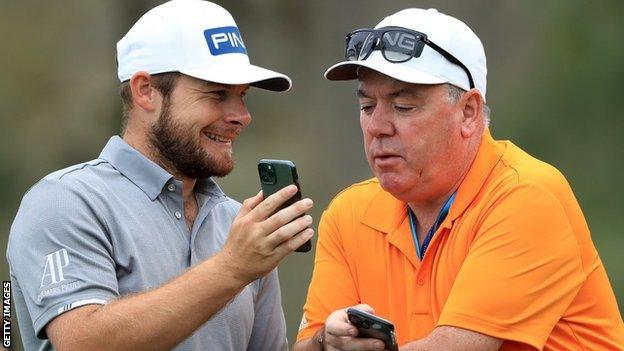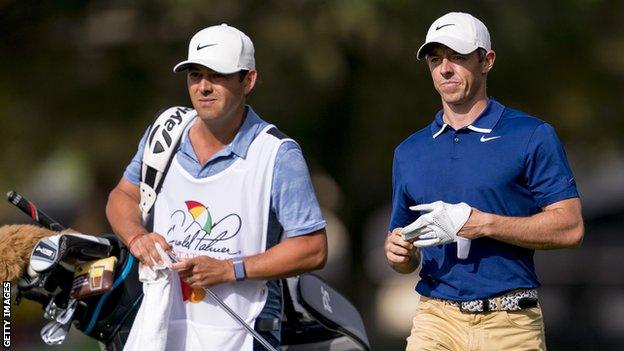Coronavirus: Golf's shutdown leads to tough times for caddies
- Published

Hatton and Donaghy are one of the closest pairs on the Tour
This was supposed to be the year when one of the most precarious sporting professions became a little more secure.
But with the coronavirus shutdown, touring golf caddies are unable to take advantage of a ground-breaking deal that should have made their largely unstable jobs a little more lucrative.
An agreement with the European Tour to allow bagmen and women to be paid for displaying branding is now in place. But no tournaments are being played and caddies are without their usual source of income.
"Something like this could not have come at a worse time," Sean Russell, chairman of the European Tour Caddie Association, told BBC Sport. "With no golf it's difficult to see sponsors wanting to sign on the dotted line at the moment."
The implications of the current indefinite break are stark for some of the most visible figures in golf. "I've talked to a few guys who are already driving taxis, contemplating working at places like Amazon," Russell added.
"Some do that in the winter anyway, but they're going to have to do stuff like this because they have families, and mortgages to pay."
Often caddies refer to themselves as "outdoor butlers" but they are intrinsic to the success of their playing boss.
Deserving credit went to Mick Donaghy for keeping the often tempestuous Tyrrell Hatton on an even keel when he won on a brutal Bay Hill course in the last PGA Tour event to be completed before the shutdown.
Donaghy, an experienced and blunt Scotsman said he "won't put up with" any of Hatton's nonsense. "That's what he needs. That's why I'm employed - to threaten him and kill him."
And lug a 25kg golf bag for around a dozen kilometres a day, not to mention contribute to tactical decisions on an array of crucial shots.
Donaghy picked up around £135,000 from Hatton's victory, assuming he was paid the usual 10% of the winner's cheque. His situation should be more comfortable than many of his counterparts.
"The guy who worked for the seventh-ranked player last year [on the European Tour] is doing all right and earned quite a bit of money," said Russell. "The guy who worked for the player who finished 157th probably isn't.
"His potential earnings are really quite small; that's the thing that people don't see. That guy still has the same expenses, if not more, than someone who caddies for a really top player, but they are earning way less."
Most caddies are paid a weekly fee, probably around £1,000. "You negotiate that with the player and that covers your expenses. And then you get a percentage of what the player wins," Russell explained.
"It sounds a lot, but take into account air fares, six to seven nights in a hotel, and you usually eat out every night, so it soon mounts up.
"A caddie's true earnings come out of the bonus. But if the player is winning nothing, either because he's missing cuts or not playing, the bonus is zero."
Russell admits that he and his colleagues enter this world with their eyes open to its precarious nature. "There's no sick pay, holiday pay and no guarantees or HR in there," he said.
"Tomorrow I could turn up and my player might not like the colour of the pants I'm wearing and he could fire me and I've got no comeback."

Rory McIlroy works with long-time friend Harry Diamond
The 55-year-old former civil servant caddies for Frenchman Jean Baptiste Gonnet, who has failed to make it to the final day of any of the three events he has played this year.
Russell is in a more secure position of being semi-retired but knows many of his younger colleagues have not been able to build nest-eggs for periods such as the one we are currently enduring.
This is why he is trying to find earning opportunities through the Caddies' Association which is promoting the @TheTourCaddies, external brand in social media.
"We are working with Rocket Yard Sports who are bit like an agent for the association," he said.
"We also want partnerships with companies who we would lend our name to, and for that they would pay a fee. The idea is to have between five and 10.
"We have a couple where we are at the stage of reviewing contracts with them."
The association is also publicising an initiative for club golfers to hire a tour caddie for a day. "Give them a lesson on course management, to carry the bag and tell players what to look for and how a pro would approach these things," said Russell.
"It's a really good thing to do because it will improve your golf."
But in the current situation, earning opportunities are very limited for this group of people. They have to cling to the hope that professional golf will return to full strength once the crisis eventually passes.
In that sense caddies might be better placed than people in other walks of life. "It's a hardship for us but at the end of the day it's probably temporary," Russell said.
"For others really at the sharp end, their livelihoods could disappear and the money they've put into businesses could go. So we shouldn't feel too sorry for ourselves."
